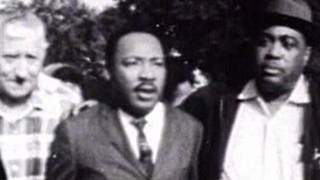
Guests
- Jesse Jacksoncivil rights leader and founder of the Rainbow/PUSH Coalition.
We speak to the famed civil rights leader as he walks a group of Madison students back to school as they reopen following a week of teacher protests, who joined tens of thousands of others to oppose the state’s efforts to pass anti-union legislation targeting public employees. “It’s no longer about workers making economic concessions,” Jackson says. “It’s about the Governor wanting to deny workers the right to collective bargaining.” [includes rush transcript]
Transcript
AMY GOODMAN: We move from the Middle East and Midwest. For more than a week now, Wisconsin has been the focal point in a national fight to protect workers’ rights. Republican Governor Scott Walker sparked an uproar after announcing plans to cut pay and eliminate collective bargaining rights for public employees. The unions have agreed to accept all Walker’s proposed cuts, which would see them pay 12 percent of their health benefits, half their pension costs, but the unions have refused to relinquish their right to collective bargaining.
As the standoff continues in Wisconsin, the struggle is intensifying in other states. On Monday, Iowa’s Republican Governor Terry Branstad called for a measure that would bar public workers from negotiating their health benefits. In Indiana, Republicans have proposed a bill to remove union membership as a condition of employment. Meanwhile, in Ohio, tens of thousands are expected to pour into the State Capitol of Columbus today for a rally against Senate Bill Five. The measure would require state employees to abandon collective bargaining, pay more toward health insurance premiums, and switch to a so-called “merit-based” pay system. Republican Governor of Ohio John Kasich has said public employees who go on strike should lose their jobs.
GOV. JOHN KASICH: If they want to strike, they should be fired, under this —- you know, you should not allow -— you know, look, you can have the change in the law that says, you know, we — again, these decisions are not finally made, but, you know, there are ways to say that you’re not going to strike, and we are going to continue negotiations without a binding arbitrator.
REPORTER: And just to make sure I’m clear, you do not think police and fire, emergency services, should have the right to strike?
GOV. JOHN KASICH: I really don’t favor the right to strike of any public employee, OK? That’s my personal philosophy. How practical that is to implement, you know — but my personal philosophy is I don’t like public employees striking, OK? I mean, they have good jobs, they’ve got high pay, they’ve got good benefits, a great retirement. What are they striking for?
AMY GOODMAN: That was Republican Governor of Ohio John Kasich.
For more on the struggle from Ohio to Wisconsin, we’re going to start in Wisconsin because the Reverend Jesse Jackson is walking with a group of students into school, their first day back to school in, oh, more than a week. He is part of this rally to reopen the Wisconsin schools.
Reverend Jackson, welcome to Democracy Now! I know you’re headed to Ohio, where we’re going to go next, but talk about the scene right now where you are in Madison.
REV. JESSE JACKSON: Good morning.
AMY GOODMAN: It’s good to have you with us.
REV. JESSE JACKSON: Well, it is an awesome scene here, where workers are fighting for basic economic justice. And yet, they go back to school today, because there have no conflict between children pursuing an education and teachers having job security at the same time. I recall in the '60s we would be marching and studying at some time, taking out books to the jail cell. And so, teachers are going back to school today, but the struggle here for workers' rights or collective bargaining will not stop, nor will their quest to have educational equity for all of the children.
AMY GOODMAN: Reverend Jackson, we were just playing a clip of actually the Ohio governor, John Kasich. You’re headed to Ohio next. But talk about Madison as ground zero for this worker rebellion, a citizen rebellion, in Wisconsin.
REV. JESSE JACKSON: Yeah, what is significant here is that it’s no longer about workers making economic concessions. It’s about the Governor wanting to deny workers the right to collective bargaining. He wants to move to a real states’ rights ideological posture. And workers cannot give up their basic right to collective bargaining. I mean, Dr. King’s last act on earth, marching in Memphis, Tennessee, was about workers’ rights to collective bargaining and rights to dues checkoff. You cannot remove the roof for the wealthy and remove the floor for the poor. And that’s what’s happening, with the Glass-Steagall Act removing the roof for the bankers and making corporations be a person, remove the roof for the rich, and then crush the floor for working people. And that’s not right. And workers should not be the scapegoats for this economic collapse. Workers are not the reason why we had the home foreclosure crisis with greedy banks and lack of oversight. It’s not workers’ fault that we have a misadventure into Iraq and Afghanistan for a trillion dollars, or a trillion-dollar tax deal at Christmas time — you cut taxes for the wealthy and cut jobs for workers. Workers should not and must not be the scapegoat for this. Again, the beauty here in Madison is that at least in places like Libya, they don’t have the right to fight the right; in America, we do. Let’s decide that right to fight for the right.
AMY GOODMAN: Well, Reverend Jackson, I thank you for being with us. We’re going to be going to Ohio in a minute, where you’re headed to today.












Media Options